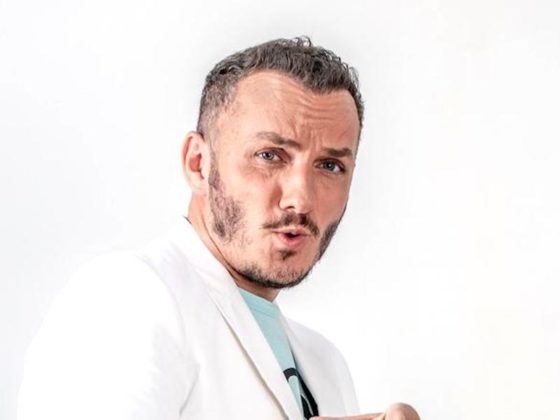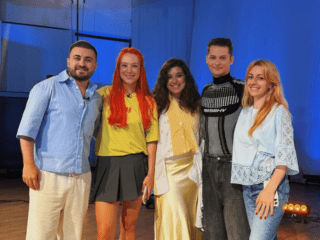One of Ukraine’s most recognisable pop divas, Olya Polyakova, built her career on flamboyant performances, humour, and a knack for reinvention. When Polyakova filed her Eurovision application on 16 October 2025, she probably knew what was coming.
Over the past decade, she transformed from a tabloid figure into a cultural symbol – first nicknamed Ukraine’s Queen of the Night, later she became a wartime activist supporting displaced families and performing for soldiers.
Her attempt to go to Eurovision isn’t just another PR move; it appears to be a stress test for how much Ukraine’s music industry – and its collective memory – has evolved since the war began.
It’s the first open confrontation of this scale between a Ukrainian superstar and the country’s public broadcaster Suspilne.
A rule from the past meets a star of the present
The rule was clear: anyone who performed in Russia after 15 March 2014 cannot represent Ukraine. But she had. A hosting gig at Moscow’s RU.TV awards in 2015 remains on her record like a timestamp from another life. And yet, she decided to click the submit button anyway. A decade after the war broke out, she wanted to know if the country had changed as much as she had.
Up until this point, no artist of her stature has ever challenged the organisation that guards Vidbir‘s rules like a sacred scripture.
To some in Ukraine, she’s just being dramatic. To others, she’s asking the question nobody else had the courage to ask: for how long will the past dictate what Ukraine can and cannot be?
The origins of the post-2019 rule change
The rule and restriction dates back to 2019, shortly after MARUV had taken victory in Vidbir but refused to sign a contract banning concerts in Russia. The ensuing scandal and eventual withdrawal of Ukraine in the contest, led Suspilne to adopt a strict rule: if an artist had toured in Russia since 2014, they were not allowed to participate in Vidbir.
The idea was simple – no compromise with the enemy. But in practice, it divided all artists in different camps, measured by that particular moment in time. You either were a “patriot” or a “traitor”. And that moment in time now feels a lifetime away to a new generation.
In 2021, commercial broadcaster STB‘s union with Suspilne dissolved. The public broadcaster then took full ownership of Vidbir – and with it, the moral responsibility for keeping the rule intact. Officials still repeat the same phrase whenever asked: “The war’s starting date beginning cannot be moved.” For them, 2014 is not just history – it’s like a border stone. Touch it, and the whole narrative of Ukraine’s war, culture, and identity begins to move.
But 2025 is not 2019. The industry is different, the audience older and the war longer. The rule itself was only introduced in 2019. It only by then banned artists who had performed in Russia after 2014 – meaning that for the first five years, this problem simply didn’t exist.
For a long time, it wasn’t about morale: many Ukrainian artists still worked across both markets, and only after the MARUV scandal, the restriction became official.
Back in 2019, it made sense – it protected Ukraine’s image from those seen as supporting the aggressor’s economy. But today, no major Ukrainian artist performs in Russia. The landscape has changed; people have made their choices and now live with their legacies.
The birth of Olya Polyakova’s latest track “Warrior”
Before the subsequent legal letters and Facebook statements, there was music. Long before her name turned into a headline in Ukraine, Olya Polyakova was quietly building something new – a project meant to speak louder than any press release.
The premiere on 16 October wasn’t just a video drop; it was a statement. At a private screening, Polyakova announced she had submitted her application for Ukraine’s national Eurovision selection.
Alongside it came an open letter to the broadcaster Suspilne, asking them to change their stance: “Rules must evolve with the country. We’ve all changed – our culture, our values, our society.” she wrote.
The words landed like a manifesto wrapped in a pop press release.
“Warrior” was crafted with award-winning duo Red Triangle (Halsey, aespa, JADE, Louis Tomlinson) and created in partnership with pioneering British label The state51 Conspiracy. It turned into her first English-language project – a clean pop song with cinematic structure.
The single became her passport to a new identity: less glitter, more grit. When she sings “Warrior,” her voice isn’t trying to entertain. It’s armoured. Determined.
The music video matches that ambition. Co-produced with the British team Red Triangle (whose credits include Måneskin, Little Mix and Sabrina Carpenter), it’s a hyper-stylised mix of live footage, 3D graphics, and AI-generated imagery – halfway between a superhero movie and a Ukrainian myth. Director Mitya Shmurak calls it “a story about courage, rebirth, and the fight between good and evil.” The choreography by Oleg Zhezhel from Kazaky adds a charged, almost ritualistic energy.
Symbolism runs through it: Princess Olha reimagined as a cyber-warrior, the Force Choir – a 50-member LGBTQ+ collective from the UK – echoing behind her. Their harmonies bring spirituality; freedom becomes the melody, defiance the refrain.
“The rule stands”: Suspilne responds to Olya Polyakova
Polyakova’s main argument was sharp but controversial. Ten years into the war, she asked whether the same rules still serve their purpose. “Such clauses contradict the law,” she wrote, “and violate equality.” She promised to fund her performance herself – staging, costumes, travel, everything – “not a penny from the state.” It was more than logistics; it was a way to strip the fight of any easy excuses.
Four days later, on 21 October, Suspilne answered her inquiry. The broadcaster confirmed they received her official letter but made their stance clear: the rules are staying.
After the submission period opened on 3 September, none of the selection rules could be altered anymore. “The date of the war’s beginning cannot be moved,” the statement read.
For Suspilne, it’s about maintaining public trust in a wartime process. For Polyakova, it’s about artistic evolution and the right to redefine herself. Her song “Warrior” sits between two worlds – part pop song, part legal argument, echoing a decade of national memory.
To clarify whether any exceptions or appeals exist for artists affected by this restriction, Wiwibloggs sent an official inquiry to Suspilne.
In its written response, the broadcaster stated, “Participation in the national selection takes place under equal conditions for all participants, without any exceptions. The rules of the national selection do not provide for appeals regarding the participation of artists who fall under the restriction.”
At the same time, while Suspilne continues to stick to its own rules, even Jamala – Ukraine’s 2016 Eurovision winner and this year’s Vidbir music producer – admitted in a recent interview that these rules should be rewritten, noting that she herself performed in Russia after 2014.
Can a pop star sue her way to Eurovision? We’re about to find out.
By late October, the polite emails had turned into open fire. “They should be having a dialogue with society, not acting like gatekeepers,” Olya Polyakova said, her voice breaking only once – more from exhaustion than fear.
A day later, an ultimatum followed. Either the restriction changes, or she would file be a lawsuit. “The Constitution is on my side,” she insisted, adding that her legal team had already filed documents.
For an artist long associated with spectacle and satire, the shift into legal language was unexpected – but it got attention. Every outlet in Ukraine, from tabloids to political talk shows, ran the same headline: POLYAKOVA TO SUE SUSPILNE. The Eurovision dream had morphed into a constitutional debate.
Polyakova’s producer Mykhailo Yasynskyi soon stepped in, questioning the rule’s consistency.
“It’s a selective rule,” he argued. “Many artists once performed in Russia – why pretend otherwise?”
For him, the issue wasn’t just about Olya – it was about the industry’s need to clean up its moral double standards. Yasynskyi claimed the clause was “a mistake inherited from the STB (TV channel, Vidbir ex-partner) era” and should at least be discussed publicly.
Then came more letters. According to public statements, Polyakova’s team sent formal notifications to both Suspilne and the European Broadcasting Union, urging EBU to “intervene in the situation.”
It was mostly symbolic – as we know the EBU rarely touches national selections unless rules breach Eurovision’s own framework. Still, the gesture had weight. It placed Ukraine’s internal debate under the Europe-wide spotlight, forcing the question of whether exclusion can coexist with inclusivity.
Public reaction and the online divide on the matter in Ukraine
After the news came that Olya Polyakova would challenge Suspilne, Ukrainian social media exploded. Public opinion split. Supporters called Polyakova brave; critics accused her of provocation.
“She knew the rule and still applied,” one comment read. “Now she plays the victim.”
Telegram channels in Ukraine seemed to turn the story into a referendum on morality: #TeamOlya vs #TeamSuspilne. The divide wasn’t just about music – it was about identity, memory, and forgiveness. In a country at war, even pop songs can turn into battlefields.
Some legal experts in Ukraine have said a court case like this would be unprecedented in Ukraine’s Eurovision history. If she wins, it could freeze the selection process mid-season, forcing a rewrite of the rules and possibly voiding results. If she loses, it reaffirms Suspilne’s authority to enforce its rules without exceptions. Either outcome leaves scars for Ukraine’s star at Eurovision 2026.
There’s talk that 2027 might bring revisions anyway – a cautious update once the war’s narrative settles. But that’s future tense.
For now, the image is plain and simple: a singer in a sequined dress facing down a state institution timestamping 2014 as a moral barrier. With her letters sent to Geneva, hashtags are multiplying and lawyers are refining their statements.
Ukraine’s Eurovision story keeps writing itself
It’s absurd and serious at once – Eurovision always is. But this time, the stage isn’t just in Vienna. It’s in every living room in Ukraine, where people scroll through the headlines and silently decide who they believe: the warrior or the rulebook.
Ultimately, it’s about how a country at war defines fairness – and whether principles can evolve without losing meaning.
For Suspilne, the answer is “no” at this moment. Their reputation rests on moral clarity, on rules that draw a hard line between then and now. The broadcaster carries the trust of a nation still counting its losses, and to move that position, even changing the restriction to a more recent year, feels like betrayal.
For Olya Polyakova, that stance looks like a locked door. “Warrior” isn’t just her next single – it’s her reintroduction to the world. An English-language record, a global sound, a woman reclaiming her narrative after years of glitter and scandal. Eurovision was meant to be the launchpad. Now it has become a battle.
“I’m doing this honestly, openly, and legally,” she said. “This isn’t just about me – it’s about the right to dream.”
For Suspilne, keeping their position firmly is an act of survival. For Polyakova, the resistance to this position is her reinvention. Both are right, and both are trapped by what they represent – one duty, the other desire.
And that’s the real story. Beyond the press statements and hashtags, Ukraine’s Eurovision debate has become a mirror. It shows a nation still learning how to balance pain with progress.










Russia invaded and annexed Ukrainian territory in 2014, if you choose to ignore that to make a quick buck shame on you.
Perhaps she could go to Intervision?
What in the AI buzzterms is this article?
Ukraine have been doing just dandy sending artists who haven’t crossed the picket line. Don’t see why that has to change now.
Olya Polyakova straight to San Marino Song Contest.
To be clear: Maruv didn’t just refuse to sign that contract over restrictions on her tour schedule. As I recall, the broadcasters wanted to micromanage her performance which they had dubbed too provacative. She also objected on those grounds. This article presents that whole mess like she was being unreasonable, but her Vidbir win being challenged like that was targeted unfairly.
Moreover her Lady Gagaish song is not good, it’s flat and so uninspired, it wouldn’t do wonders in Eurovision at all so no need to do this useless scandal for THAT.
I’m team Suspilne more than ever, cause I’m not into selfish people who can’t recognize their mistakes. Moreover the war is still going, it’s so misplaced for her to make this dirty move only to get maybe international recognition by gping to Eurovision, how selfish. She really feels above the rules? What message would send Suspilne by selecting a representative like her? Ok Jamala performed in Russia too before BUT the situation wasn’t the same in 2016 as it is now and since 2022. Let’s discuss the rules change when the war is over but not now. To discuss that… Read more »